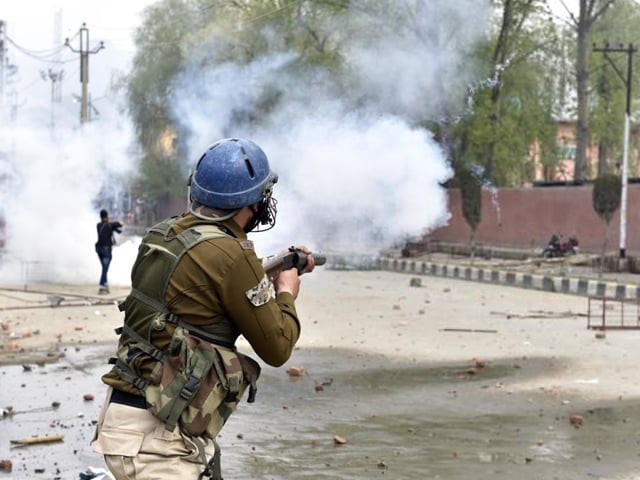Indian democracy comes to weep in Kashmir. The elected government in Srinagar seems to exist just for show, for it is the military which holds all echelons of power and dictates the narrative and future of the valley. The legislature – the elected representative of the people – is seemingly more helpless than the common people of the state.
If you hold a protest in the Kashmir valley, it is not taken as democratic dissent; rather, it is automatically viewed as an anti-national act. Your cry for justice is perceived as an act of defiance, and subsequently, a voice for Pakistan. Whether you like it or not, the fact remains that the moment one speaks out against the Indian establishment, it is termed an act of terror, supported by the Islamic country across the border.
New Delhi is now a prisoner of this paranoia. Ever since Narendra Modi became the prime minister of India, he has institutionalised this paranoia. Therefore, not only does the government act with a closed mind, but a large section of the Indian middle class and national media also view the current situation with a very narrow political prism.
It is this mindset which declares any Indian soldier who kills a Kashmiri a hero. The larger Indian media and India’s middle class do not get pained at the suffering of a normal Kashmiri any longer. They see the Kashmiris’ voice of anger as an act of perjury, see them as traitors, and thus rejoice at the pain inflicted on the people, feeling proud of the soldiers who inflict brutalities on Kashmiris.
This deviant and inhuman nationalism has now become a popular narrative in the mainstream media as well. In a recently released Bollywood movie, Baaghi 2, the Indian army’s brutality in Kashmir was glorified, with a particular sequence showing a Kashmiri man tied to the bonnet of a jeep to protect the protagonist from an angry mob. The film picked up this sequence from a real life event in a village in Kashmir, where the Indian army tied a Kashmiri man to the bonnet of a jeep to use him as a human shield against stone-pelters. New Delhi never took any action against the guilty officer. On the contrary, it justified the act and a section of the media hailed it as the best counter-terror measure.
Hindu nationalists and the parts of Indian media sympathetic to the ruling Bharatiya Janata Party (BJP) have also been justifying the Kathua rape and supporting the accused in the incident, simply because the victim is a Muslim girl. Never before in independent India’s history has such a rape and brutal murder of a little child been communalised and justified by those in power.
The issue has perhaps been a bigger source of conflict in India because of the multiple dynamics at play. Yes, the bottom line is a little girl was raped and murdered. But the victim was Muslim, while the perpetrators were Hindu. Additionally, the victim was a Muslim settler, while the perpetrators were Hindus from Jammu, which is a Hindu majority area in the Muslim majority state of Jammu and Kashmir. The response to the Kathua incident was thus not just a response to rape; it was also a reaction to the increasing Hindu-Muslim divide in India, as well as the increasingly polarising view of the Kashmiri Muslims.
One of the arguments given by those defending the rapists and murderers was that the rape is a conspiracy by Kashmiri Muslims to defame Hindus, while they also questioned why there is such hue and cry for the killing of one girl when thousands of Hindus have been driven away from the valley by Muslim insurgents since the 90s.
It is clear that Modi’s regime has accelerated the process of demonising the Kashmiris, both as Kashmiris and as Muslims.
Given this increasing divide, it has resulted in a complete breakdown of trust between the people of Kashmir and the government. While previous governments in Delhi have contributed to this, it is the present regime, driven by a vicious majoritarian and sectarian agenda, which has irreparably damaged the valley.
The Hindu party in Delhi has now completed four years in office, and in all these years, it has not once initiated any kind of peace move towards solving the Kashmir issue with Pakistan. You expect a new government to take an approach of peace and reconciliation, and at the very least, have a pacifist approach towards what it calls its own people. Unfortunately, this has been prominently absent in the BJP government.
On the other hand, the government only speaks the language of gun and violence as it kills civilians, while the genuine grievances of the Kashmiris are in turn termed seditious.
In desperation, young boys are picking up guns and dying in defiance. In four years, Kashmir has developed a homegrown network of resistance, and now they are willing to go to any extent to fight the government.
In light of recent events, with the killing of civilians by the Indian army being highlighted and noted by the United Nations as well, New Delhi cannot get away by simply accusing Pakistan for being responsible for the militarisation and radicalisation of the new generation of Kashmiris. Islamabad, undoubtedly, has its own interests in the valley, and openly supports the Kashmiri resistance, but given the nature of the people’s grievances, India cannot, in good conscience, shirk its role in the escalations or fail to take responsibility.
However, has India tried to find a way out of the situation? Has it tried to deescalate the situation in South Asia, particularly in Kashmir?
On the contrary, Modi’s government is doing everything possible to keep the embers of militancy and terrorism burning in South Asia.
As a result, mainstream India is also suffering. There is a new breed of radical Hindus who are now an alter ego of their Islamic brethren, and are free to spread terror and commit crimes without any consequence. The havoc they create in the secular, multicultural India will only harm the country in the long run.
By keeping Kashmir, India wanted to showcase to the world that it is a living example of secularism, and not a Hindu state, unlike Pakistan which is an Islamic state. Seventy years down the line, in a country thoroughly divided over basic moral issues, New Delhi simply cannot support that argument anymore.
Want to be a hero in India and get recognition in a movie? Go to IoK and kill a Kashmiri!
They see Kashmiris’ anger as an act of perjury, seen as traitors, and feel proud of soldiers inflicting brutalities.

Policeman firing tear gas at protesting Students of Amar Singh Degree College outside their college while protesting after four days of shutdown over the Shopian killing, on April 5, 2018 in Srinagar, India. PHOTO: GETTY


COMMENTS
Comments are moderated and generally will be posted if they are on-topic and not abusive.
For more information, please see our Comments FAQ